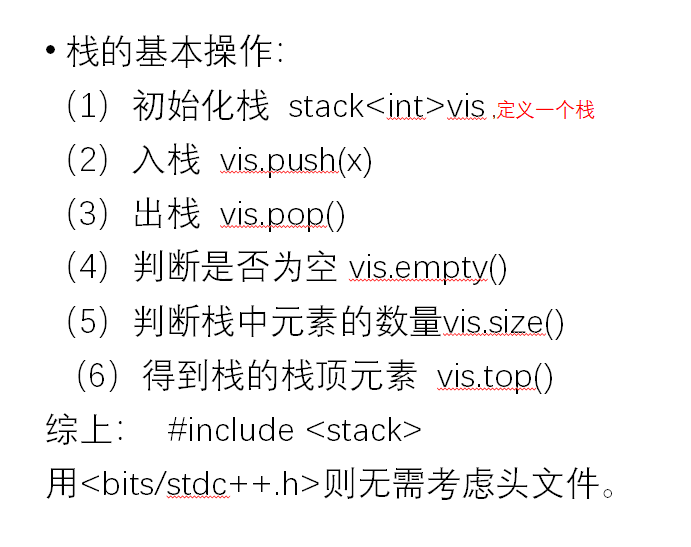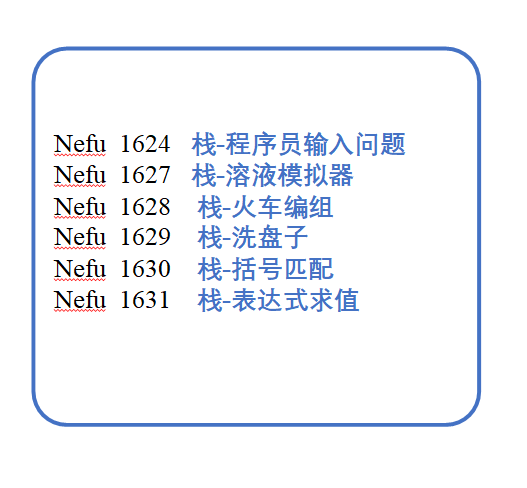Winter vacation training (7) - NEFU
order

Today's topic

1. Stack programmer input problem nefu 1624
#include <iostream> #include <bits/stdc++.h> using namespace std; int main() { stack < char >s1; stack < char >s2; char str[110]; gets(str); int l=strlen(str); int i; for (i=0;i<l;i++) { if (str[i]=='@') { while (!s1.empty()) s1.pop();//Need to cycle through the previous characters when @ is continue; } if (str[i]=='#') { if (!s1.empty()) { s1.pop();//Only need to cycle once when it is continue; } } s1.push(str[i]);//The characters that are neither @ nor ා are stored in s1 as required characters, but pay attention to first in first out, so s1 cannot be output directly } while (!s1.empty()) { s2.push(s1.top()); s1.pop();//Because the stack is first in and last out, another stack is needed here to change the stored character order } while (!s2.empty()) { printf("%c",s2.top()); s2.pop(); } printf("\n"); return 0; }
2. Stack bracket matching nefu 1630
#include<bits/stdc++.h> using namespace std; typedef long long ll; char str[256]; int main() { scanf("%s",str); int l=strlen(str); stack<char>a; for(int i=0;i<l;i++) { if(a.empty()) a.push(str[i]); else { if((a.top()=='['&&str[i]==']')||(a.top()=='('&&str[i]==')')) a.pop(); else a.push(str[i]); } } if(a.empty()) printf("OK\n"); else printf("Wrong\n"); return 0; }
3. Stack expression evaluation nefu 1631
At first, I read the wrong question, thinking that there are four operations of addition, subtraction, multiplication and division. As a result, only multiplication and addition are included in the original question. 😦 ❤️ ❤️
There are five days left for the New Year! A kind of
☀️☀️☀️☀️☀️☀️☀️☀️☀️☀️☀️☀️☀️☀️☀️☀️☀️☀️☀️☀️☀️☀️☀️☀️
#include <bits/stdc++.h> using namespace std; int main() { long long int a,af,be,ans; char tmp; stack <int> s ; int ss; ss=0; ans=0; while (scanf("%lld",&a)!=EOF) { if (s.empty()) { s.push(a); scanf("%c",&tmp); } else { if (tmp=='*')//Here I only wrote an = sign at the beginning, and then I found the bug for half an hour:) { af=s.top(); s.pop(); be=a; s.push((af%10000)*(be%10000)); } else { s.push(a); //Scanf ("% C", & TMP); wrong position at the beginning:( } scanf("%c",&tmp); } if (tmp=='\n') break;//End the loop, otherwise the next while loop will not be possible } while (!s.empty()) { ans+=s.top(); s.pop();//The last while is multiplication, so the rest is all addition } printf("%lld\n",ans%10000);//Pay attention to the conditions in the question, only take the last four!!! }
4. Stack solution simulator nefu 1627
❤️ ❤️ ❤️ ❤️ ❤️ ❤️ ❤️ ❤️ ❤️ ❤️ ❤️ ❤️ ❤️ ❤️ ❤️ ❤️ ❤️ ❤️ ❤️ ❤️
#include <bits/stdc++.h> using namespace std; struct lay { int v; double c; };//Structure stack stack<lay>vis; int main() { ios::sync_with_stdio(false);//Lifting speed char ch; int v1,v2,v0,v3; double c1,c2,c0,c3; int n; cin>>v0>>c0; v2=v0; c2=c0; cin>>n; while (n--) { cin>>ch; if (ch=='P') { cin>>v1>>c1; vis.push({v1,c1}); c0=((c0*v0*0.01+c1*v1*0.01)/(v1+v0))*100;//Anti overflow v0+=v1; printf("%d %.5lf\n",v0,c0); } else { if (vis.empty())//Pay attention to the conditions in the questions and make judgment { printf("%d %.5lf\n",v2,c2); continue; } else { lay tmp=vis.top(); vis.pop(); v3=tmp.v;//structural morphology c3=tmp.c; c0=((v0*c0*0.01-v3*c3*0.01)/(v0-v3))*100.00; v0-=v3; printf("%d %.5lf\n",v0,c0); } } } return 0; }
5. Stack wash dishes nefu 1629
Although this question uses three stacks, it is not as difficult as the first two questions
#include <bits/stdc++.h> using namespace std; int main() { ios::sync_with_stdio(false);//Speed up stack <int> n0; stack <int> n1; stack <int> n2;//Using three stacks int n,i,j; int x,y;//Number of 1 wash and 2 wipe //int tmp1,tmp2; cin>>n; for(i=n; i>=1; i--) n0.push(i);//Order of unwashed dishes!!! Pay attention to the order of placing, one at the top //while (!n0.empty()||!n1.empty()) while (cin>>x>>y) { if (x==1) { for (j=0; j<y; j++) { n1.push(n0.top()); n0.pop(); } } if (x==2) { for (j=0; j<y; j++) { n2.push(n1.top()); n1.pop(); } } if (n0.size()==0&&n1.size()==0) break;//Pay attention to end the cycle!!! } while (!n2.empty()) { cout<<n2.top()<<endl; n2.pop(); } return 0; }

